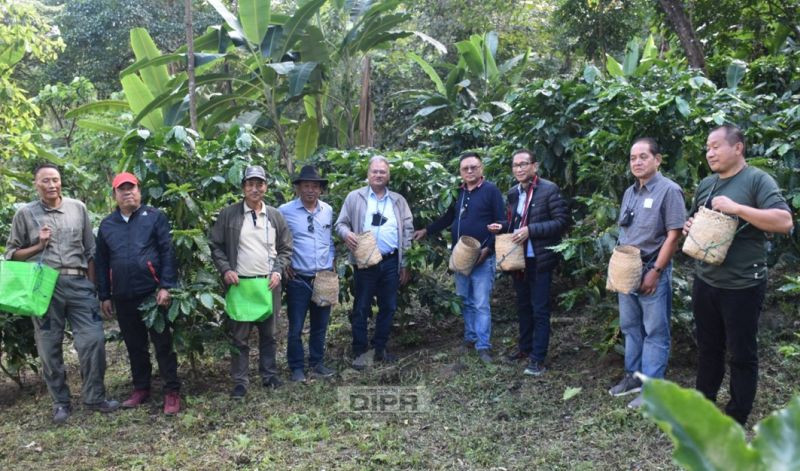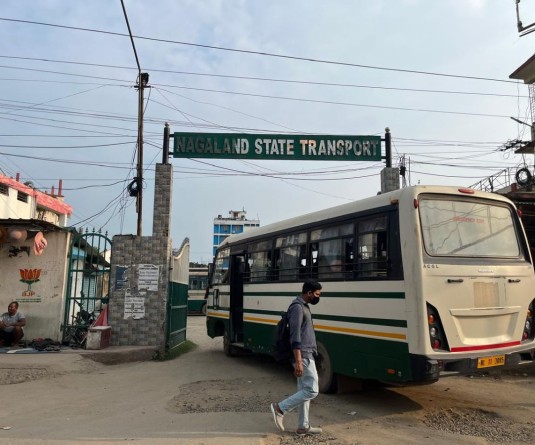Nagaland Chief Secretary J Alam with APC Y Kikheto Sema and others harvesting coffee cherries during an experiential visit to KAAS Coffee Farm in Sendenyu Village, Kohima on November 4. (DIPR Photo)

Chief Secretary visits KAAS coffee farm
Kohima, November 4 (MExN): Chief Secretary (CS) Nagaland, J Alam on Thursday remarked that while the government could not focus on many developmental activities during the pandemic, it also showed the state’s dependence on the outside world and how much requirement there is to be self-dependent in terms of economic needs.
The CS made the statement during an experiential visit to KAAS Coffee farm, Sendenyu village, Kohima on November 4 along with Agriculture Production Commissioner, Nagaland, Y Kikheto Sema and Land Resources Department officials.
According to a DIPR report, the Chief Secretary expressed delight to have an actual hands-on experience in the field for coffee harvesting and processing. He commended the amount of ground work going on and lauded the progressive villagers undertaking such activities.
Alam stressed that the government employment has reached its saturation point, and that the youth have to find and invest in other avenues. Coffee being a very promising crop, he urged the youth to take up activities which are labour intensive and provide sustainable income.
“Potential has always been there, and we are blessed with a very fertile land and huge resource, for the last decades we have been experimenting in different land based activities for viable crops unfortunately it failed because substantial activities was not taken into consideration,” he stated.
He also lauded the village for being a biodiversity conservative village and appreciated the efforts of the cautious villagers for protecting and conserving the density of forest which he said, will contribute a lot in balancing the biodiversity.
The CS also assured that the government will support in all possible areas and that requirement for further developments would be taken up with the concerned department.
Agriculture Production Commissioner, Nagaland, Y Kikheto Sema, stated that the hills of Nagaland are now growing organic coffee, which is not only being sold locally but exported in international markets. He also highlighted that coffee, was introduced to the farmers of Nagaland in the 1980s but lack of market linkages and other factor forced the farmers to give up the cultivation. Headed by him, LRD in 2016 again decided to revive coffee cultivation and learn about the new varieties of coffee seeds, how to plant and grow them in the cool and hilly climate of Nagaland.
Nagaland at present has nearly 10,000 hectares of coffee cultivation and it is taking steps to expand it to 50,000 hectares by 2030, he informed.
The Land Resource Department has exported 27.5 metric tonnes of coffee to the South African company, which signed an agreement to buy Nagaland coffee for 30 years, Sema added.
"Our aim is to generate at least one lakh jobs as Nagaland lacks industrial activities. Another aim is to prevent the impact of climate change by encouraging farmers to give up jhum cultivation and switch over to coffee,” Sema said.
Dr G Thong (HoD, Orthopedics NHAK)highlighted the activities of Kebentsin Agri & Allied cooperative Society (KAAS) Sendenyu village of KAAS Coffee farm. He briefed that that Kebentsin Agri and allied society was formed by 25 members in 2015 and the main objective of forming this club was to promote and encourage honest work culture among the members and the society at large.
He also reported that the total number of coffee plants within the farm at present is around 80,000 and 1,80,000 coffee saplings have been supplied, enabling 45 households in Sendenyu area to start coffee farming.
DPO, Kohima Dr MenuosietuoTseikha elaborated on the cycle of coffee plantation, the report added.





